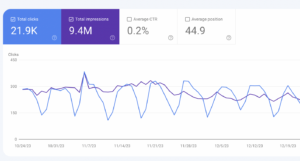In the ever-evolving online world, having a strong digital presence is vital for business success. Search engine optimization (SEO) is a powerful strategy that helps small business owners increase their visibility and attract organic traffic — leveling the playing field shared with bigger, more prominent brands.
However, while many entrepreneurs now understand the importance of SEO, the technical aspects often remain a mystery. In this article, we will unravel the world of technical SEO, providing smart business owners with a comprehensive checklist to enhance their understanding and implementation of this crucial component.
By delving into the definition, relevance, and practical solutions to common technical SEO issues, we aim to empower business owners to optimize their websites effectively and gain a competitive edge. Let’s dive into our technical SEO checklist for small businesses.
What is Technical SEO?
Technical SEO refers to the process of optimizing a website’s infrastructure and foundation to improve its search engine visibility. It involves addressing technical aspects that impact website performance, crawlability, and indexability. While content and off-page SEO factors contribute to overall SEO success, technical SEO acts as the backbone, ensuring search engines can efficiently access, understand, and rank your website.
Components of Technical SEO
Website Load Speed and Performance
Your website’s loading speed is a crucial factor for both user experience and search rankings. Optimize images, leverage browser caching, and minimize CSS and JavaScript files to improve page load times.
Mobile-Friendliness
In a mobile-first world, having a responsive website design is vital. Ensure that your website adapts seamlessly to different screen sizes and devices, or risk being penalized by search engine algorithms. Google has shifted to mobile-first indexing, so this is extremely important.
URL Structure
Create clean, SEO-friendly URLs that include relevant target keywords and accurately describe the content on the page. Avoid long, dynamic URLs that are difficult for search engines to understand.
XML Sitemap
Generate and submit an XML sitemap to search engines. This file helps robots discover and index your website’s pages more efficiently, thus improving your site’s visibility.
Canonicalization
Implement canonical tags to prevent duplicate content issues and indicate the preferred version of a page to search engines. This helps consolidate the ranking signals and avoids diluting your SEO efforts.
Structured Data and Rich Snippets
Structured data refers to a standardized format of information that enables search engines to better understand its content, while rich snippets are the visual elements that appear on SERPs. Using schema markup, you can add extra information, such as images, ratings, and reviews, to your website’s search engine results. This increases your click-through rates and helps draw more organic traffic.
Why Technical SEO Matters to Small Business Owners
Technical SEO is relevant because it levels the playing field and allows small businesses to compete with larger enterprises. By addressing technical issues, small to medium-sized businesses can improve their website’s performance and ensure that their content is being properly indexed. This leads to increased visibility and higher organic traffic, thus increasing the chances of conversions.
To put it simply, technical SEO helps small business owners gain a competitive edge and ensures that their website is easily accessible and visible to search engine bots.
Technical SEO Checklist: Issues and Solutions
There are a variety of issues that can impact your website’s technical SEO performance. Our technical SEO checklist below features the most common ones and how to fix them.
- Website Speed and Performance:
-
-
- Optimize images by compressing them without sacrificing quality.
- Enable browser caching to reduce load times for returning visitors.
- Minify CSS and JavaScript files by removing unnecessary characters and whitespace.
- Consider using a content delivery network (CDN) to distribute your website’s files for faster loading.
-
- Mobile-Friendliness:
-
-
- Ensure your website has a responsive design that adapts to different screen sizes.
- Test your website’s mobile-friendliness using tools like Google’s Mobile-Friendly Test.
- Optimize images for mobile devices and ensure fast loading times.
- Improve navigation and readability for mobile users.
-
- URL Structure:
-
-
- Create clean and user-friendly URLs that accurately describe the content on each page.
- Include relevant keywords naturally in the URL.
- Avoid using long, dynamic URLs that are difficult for search engines to understand.
-
- XML Sitemap:
-
-
- Generate an XML sitemap that includes all the pages on your website.
- Submit the XML sitemap to search engines, such as Google Search Console.
- Update the XML sitemap whenever you add or remove pages from your website.
-
- Canonicalization:
-
-
- Implement canonical tags to avoid duplicate content issues.
- Specify the preferred version of a page to search engines.
- Consolidate ranking signals and avoid diluting SEO efforts.
-
- Meta Tags:
-
-
- Ensure each page has a unique and descriptive meta title.
- Incorporate relevant keywords naturally within the meta title.
- Write compelling meta descriptions that accurately summarize the page’s content.
- Optimize meta tags to improve click-through rates in search results.
-
- Robots.txt File:
-
-
- Review and update your website’s robots.txt file regularly.
- Allow search engines to crawl and index the appropriate pages.
- Avoid accidentally blocking important content from search engine visibility.
-
- Internal Linking:
-
-
- Create a logical internal linking structure throughout your website.
- Include relevant anchor text that describes the linked page.
- Ensure all internal links are working correctly and lead to the intended destination.
-
- Schema Markup:
-
-
- Implement structured data using schema markup to provide additional context to search engines.
- Use schema markup to enhance the visibility of important information, such as business address, reviews, and product details.
-
- Site Security:
-
- Ensure your website has an SSL certificate to enable HTTPS encryption.
- Regularly update your website’s software, themes, and plugins to prevent vulnerabilities.
- Use secure passwords and consider implementing two-factor authentication.
Regularly monitor and maintain your website’s technical aspects to ensure optimal results. This SEO technical checklist offers a good, solid start.
Remember: technical SEO is an ongoing process, so stay updated with industry trends and best practices to continually improve your website’s performance.
Run a Free SEO Audit with Markitors
For business owners looking for a comprehensive SEO audit, Markitors offers a free technical SEO audit tool. By providing your website URL and email, you can receive a detailed report highlighting critical technical SEO issues.
The audit covers key areas such as website speed, mobile-friendliness, URL structure, meta tags, and more. It also provides personalized recommendations to help business owners improve their website’s technical SEO.
Overall, successful technical SEO requires consistent effort and attention to detail. With a comprehensive strategy and regular optimization efforts, business owners can enjoy lasting results in terms of higher visibility, better search engine rankings, and improved user experience. So don’t delay — begin optimizing your website with the tech SEO professionals at Markitors today!







